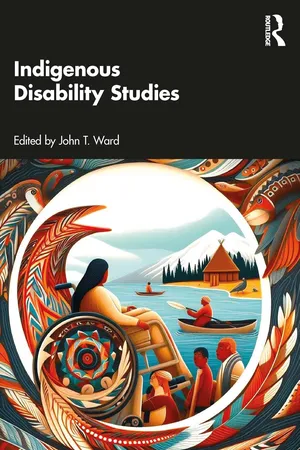
- 356 pages
- English
- ePUB (mobile friendly)
- Available on iOS & Android
Indigenous Disability Studies
About this book
This book provides a comprehensive approach to the perspectives, lived experiences, and socio-cultural beliefs of Indigenous scholars regarding disabilities through a distinctions-based approach. Indigenous people demonstrate considerable knowledge in a multitude of capacities in spite of legal, monetary, social, economic, health, and political inequalities that they experience within from administrative authorities whether health, education, or governments.
By including various knowledge systems related to social-cultural, traditional governance, spirituality, educational, and self-representation within a communal understanding, the knowledge brought forth will be a combination of information from within/communal and outwards/infusion by Indigenous teachers, scholars, academics, and professionals who aim to combat the negative effects of disability labels and policies that have regulated Indigenous peoples.
Comprised of five sections:
- The power, wisdom, knowledge, and lived experiences of Elders
- Reframing the narrative – Navigating self-representation
- Learning from within – Including traditional knowledge
- Challenging colonial authority – Infusing regional ideals and concepts
- Interpretations, narratives, and lived experiences of grassroots teachers and social service providers
It will be an asset to those who seek out a deeper understanding of the complexity of Indigenous people and their knowledge, including anyone who deals with predominantly non-Indigenous mindsets and barriers to education.
Courses on disability studies, Indigenous studies, social work, health, education, and development studies will all benefit from this book.
Tools to learn more effectively

Saving Books

Keyword Search

Annotating Text

Listen to it instead
Information
Table of contents
- Cover
- Half Title
- Title Page
- Copyright Page
- Dedication
- Table of Contents
- List of figures
- List of tables
- List of contributors
- Foreword
- Acknowledgments
- Introduction
- Part I The power, wisdom, knowledge, and lived experiences of Elders
- Part II Reframing the narrative – Navigating self-representation
- Part III Learning from within – Including traditional knowledge
- Part IV Challenging colonial authority – Infusing regional ideals and concepts
- Part V Interpretations, narratives, and lived experiences of grassroots teachers and social service providers
- Conclusion
- Index
Frequently asked questions
- Essential is ideal for learners and professionals who enjoy exploring a wide range of subjects. Access the Essential Library with 800,000+ trusted titles and best-sellers across business, personal growth, and the humanities. Includes unlimited reading time and Standard Read Aloud voice.
- Complete: Perfect for advanced learners and researchers needing full, unrestricted access. Unlock 1.4M+ books across hundreds of subjects, including academic and specialized titles. The Complete Plan also includes advanced features like Premium Read Aloud and Research Assistant.
Please note we cannot support devices running on iOS 13 and Android 7 or earlier. Learn more about using the app